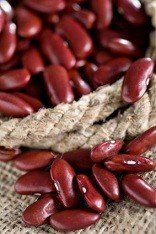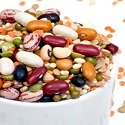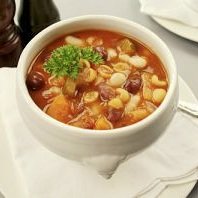Lose Weight
![]() Calories in Food
Calories in Food
![]() Calories in Vegetables
Calories in Vegetables
![]() Calories in Kidney Beans
Calories in Kidney Beans
Calories in Kidney Beans,
Kidney Beans Nutrition Facts
How many calories in Kidney Beans? See below, the Kidney Beans calories for the different serving sizes. We provide you with the Kidney Beans nutrition facts and the Kidney Beans benefits to help you to lose weight and eat a healthy diet.
Kidney beans are generally purchased dry or in cans. They provide an excellent source of vitamin B1, B9 (folate), K, fiber, manganese, protein, iron, phosphorus, copper, potassium and magnesium.
As Kidney beans are high in fiber, they are great for our digestion; lowering cholesterol and helping us feel fuller quicker. They are also believed to be good for diabetics, as they are thought to help regulate blood sugar levels. Other Kidney beans benefits include reducing the risk of heart disease.
Below are three calorie tables allowing you to compare the calories when either raw, boiled and canned. We also have a detailed nutrient table. See our vegetable calories comparison chart to compare the calories in Kidney Beans with the calories in other vegetables.
Also, have a look how nutritious Kidney Beans are in comparison to the other vegetable nutrition facts.
All of our calorie and nutrition data is provided by the US Department of Agriculture.

Calories in Kidney Beans, All Types, Mature Seeds, Raw
Refuse: 0%Scientific Name: Phaseolus vulgaris
| Serving Size | Calories per Serving |
| 100 grams | 333 kcal (1393 kJ) |
| 1 cup, 184 grams | 613 kcal (2563 kJ) |
Beans, Kidney, All Types, Mature Seeds, Cooked, Boiled
Refuse: 0%| Serving Size | Calories per Serving |
| 100 grams | 127 kcal (532 kJ) |
| 1 cup, 177 grams | 225 kcal (942 kJ) |
Beans, Kidney, All Types, Mature Seeds, Canned
Refuse: 0%| Serving Size | Calories per Serving |
| 100 grams | 84 kcal (353 kJ) |
| 1 cup, 256 grams | 215 kcal (904 kJ) |
Kidney Beans Nutritional Information
| Nutritional value per 100 g (3.5 oz) | |
|---|---|
| Proximates: | |
| Water | 66.94 g |
| Energy | 532 kJ (127 kcal) |
| Carbohydrates | 22.80 g |
| Sugars | 0.32 g |
| Dietary fiber | 6.4 g |
| Fat | 0.50 g |
| Protein | 8.67 g |
| Minerals: | |
| Calcium, Ca | 35 mg (3.5 %) |
| Iron, Fe | 2.22 mg (12 %) |
| Magnesium, Mg | 42 mg (11 %) |
| Phosphorus, P | 138 mg (14 %) |
| Potassium, K | 405 mg (9 %) |
| Zinc, Zn | 1.00 mg (7 %) |
| Copper, Cu | 0.216 mg (11%) |
| Manganese, Mn | 0.430 mg (22 %) |
| Selenium, Se | 1.1 mcg (2 %) |
| Vitamins: | |
| Vitamin C | 1.2 mg (2 %) |
| Thiamine (Vit. B1) | 0.160 mg (11 %) |
| Riboflavin (Vit. B2) | 0.058 mg (3 %) |
| Niacin (Vit. B3) | 0.578 mg (3%) |
| Pantothenic acid (B5) | 0.220 mg (2 %) |
| Vitamin B6 | 0.120 mg (6 %) |
| Folate (Vit. B9) | 130 mcg (33 %) |
| Vitamin E | 0.03 mg (0.2 %) |
| Vitamin K | 8.4 mcg (11 %) |
| Percentages are relative to US Recommended Daily Intake (RDI) for adults. | |
Author: Lana Soko
You Might Also Like:
Like This Page?
|
Share This Page:
|







